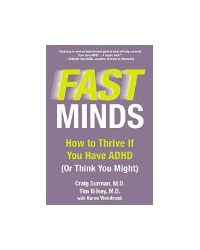“Fast Minds: How to Thrive if You Have ADHD (or Think You Might)”

“Fast Minds: How to Thrive if You Have ADHD (or Think You Might)”
By Craig Surman and Tim Bilkey with Karen Weintraub
Berkley Publishing Group
New York, N.Y., 2013
Guidebook draws on latest clinical research
Reviewed by Paul Efthim, Ph.D.
It’s an exercise in optimism (if not hubris) to write a self-help book on adult ADHD. For one thing, the market is flooded with titles already. For another, the target audience struggles staying on-task long enough to glance at the user’s manual for the new flat-panel TV, never mind slogging through a 300-page book.
But for readers who are willing to hyperfocus and give it a shot, “Fast Minds: How to Thrive if You Have ADHD (or Think You Might)” delivers a sophisticated, accessible approach to improving one’s quality of life. It’s one of the better ADHD self-help books I’ve encountered and I’m not a fan of self-help books in general.
The term FAST MINDS is a catchy acronym for the hallmark traits: Forgetful, Achieving below potential, Stuck in a rut, Time challenged, Motivationally challenged, Impulsive, Novelty seeking, Distractible, and Scattered. “Fast minds” also captures how some people with ADHD describe feeling: that their mind works too quickly, jumping from one thing to another. The acronym functions similar to SIGECAPS (for depression symptoms) as a handy memory aid for the busy clinician.
The FAST MINDS program was developed by co-author Tim Bilkey, a Canadian psychiatrist who trains physicians how to recognize and treat adult ADHD. Bilkey teamed with neuropsychiatrist Craig Surman, an ADHD researcher at Massachusetts General Hospital and science writer Karen Weintraub to produce a guidebook that draws on the latest clinical research.
In Part I, the authors explain each trait and differentiate ADHD from other conditions with overlapping symptomatology. They also cover some of the emotional aspects of living with the condition, such as how exhausting it can be to compensate for multiple traits.
Part II contains a six-chapter “operating manual” to living with a fast mind. Surman and Bilkey describe several strategies I have not seen elsewhere, such as the “prefrontal checklist” which consists of three questions to ask oneself when seeking to improve engagement with a task. Lastly, in Part III, the authors offer excellent tips on working with a prescriber, seeking professional help from others and sustaining momentum in the long run.
Thanks no doubt to the authors’ collaboration with a journalist, the book is well-organized, easy to read and can be profitably read in little bits here and there. There are extensive footnotes that ground the book in scientific research, coupled with scores of stories chock full of details that vividly illustrate the internal experience of folks living with this condition. The tone is inspirational but realistic, stressing the role of individual differences and the need for professional guidance. Many chapters have a section for family members that advises how to support a loved one with ADHD.
Although the role of medication gets its due, the bulk of the volume addresses behavioral and emotional issues. The chapter on interpersonal aspects of ADHD and dealing with social skill issues in the workplace is particularly valuable.
Despite its excellent coverage of the emotional experience of people with ADHD, surprisingly one sees only brief references to psychotherapy (CBT) and no mention at all of insight-oriented or longer-term therapies that can offer some patients life-changing help for this complex condition.
On balance, this book is an excellent resource for highly motivated persons who want to take control of their “fast minds.” It’s available in an inexpensive paperback edition that makes it accessible to all. Looking forward, one cannot help but wonder: how long it will take before someone adapts books like this for phones and tablets – a sort of hybrid e-book and productivity app? The small screen seems like a natural setting for ADHD self-help. And will smart phone-based neurofeedback be far behind? We live in interesting times.
Paul Efthim, Ph.D. is a licensed psychologist in private practice in Brookline, Mass. He holds a faculty appointment at the Boston Institute for Psychotherapy and is a candidate at the Massachusetts Institute for Psychoanalysis.
Learn more about the book: Fast Minds: How to Thrive If You Have ADHD (Or Think You Might)
